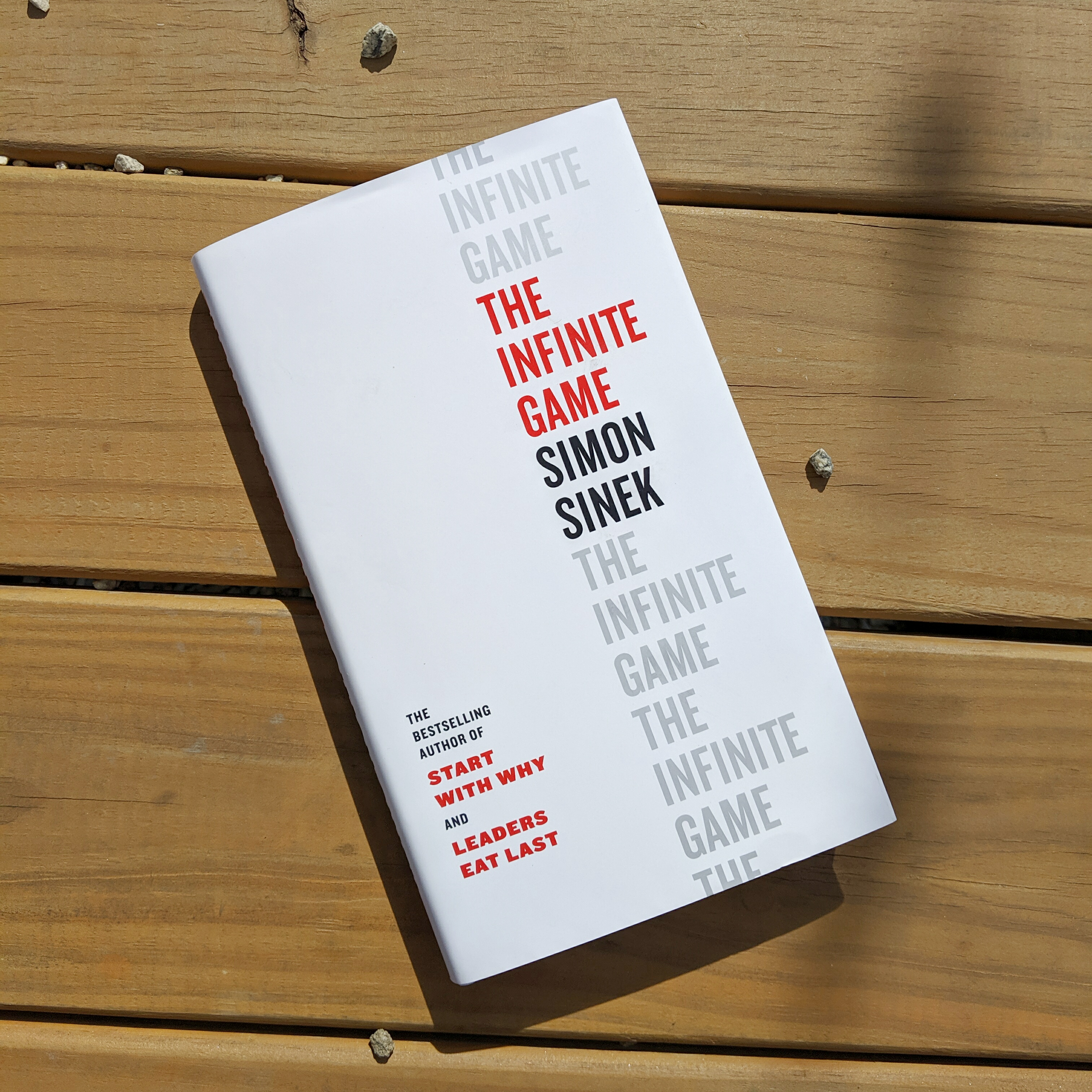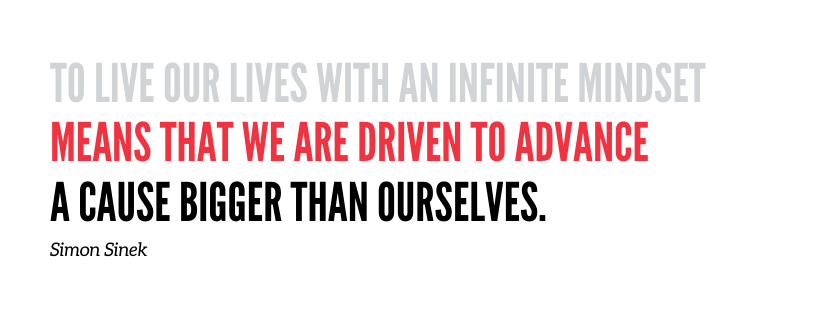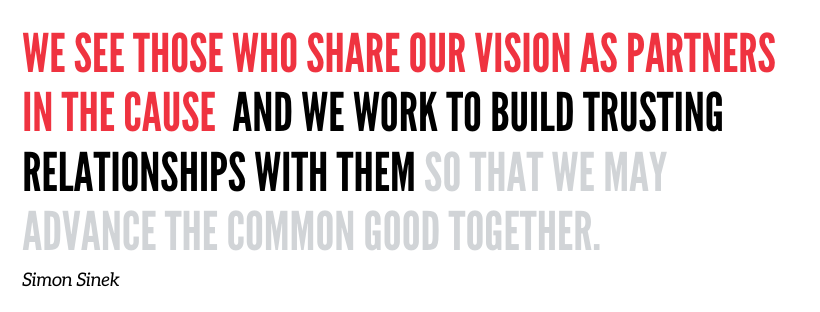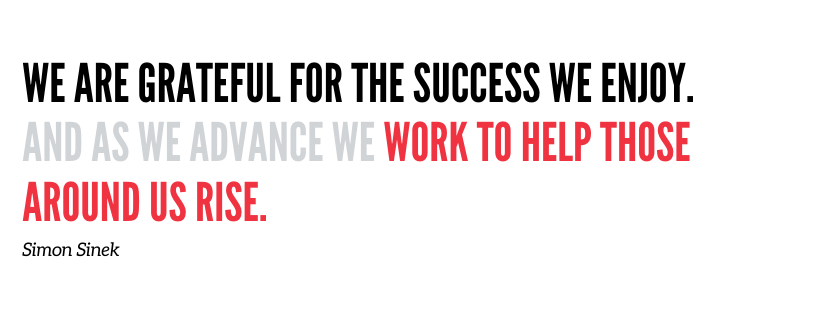
The Infinite Game of Ecosystem Building
The Infinite Game
“In a finite game, the game ends when its time is up and the players live on to play another day (unless it was a duel, of course). In an infinite game, it’s the opposite. It is the game that lives on and it is the players whose time runs out. Because there is no such thing as winning or losing in an infinite game, the players simply drop out of the game when they run out of the will and resources to keep playing.”
On page 7 of Simon Sinek’s latest book The Infinite Game, I threw my hands up in the air and furiously highlighted this entire paragraph, and many thereafter. My heart rate quickened a little and I felt excitement rising in my chest. Was it possible? Does Simon Sinek know about ecosystem building? Our efforts of nurturing entrepreneurial ecosystems so that founders in our communities can thrive are an Infinite Game! It existed before we entered the world of intentional ecosystem building, and it will continue long after we have had enough and stopped playing.
Value over Competition
“Which means, to succeed in the Infinite Game (…), we have to stop thinking about who wins or who’s the best and start thinking about how to build organizations that are strong enough and healthy enough to stay in the game for many generations to come.” Holy smokes! Yes! Instead of competing, we should be aligning our efforts toward our shared vision and strive like crazy to achieve this big audacious goal or – as Sinek calls it – our Just Cause!
“We may not know all the other players and new ones can join any time. All the players determine their own strategies and tactics and there is no set of fixed rules to which everyone has agreed, other than the law (and even that can vary from country to country).” (p. 5)
The Infinite Game of Ecosystem Building
The Kauffman Foundation has been spearheading the EShip movement to “to help accelerate the emerging field of ecosystem building, by collaboratively creating tools, resources, and knowledge to better support communities that empower the makers, doers, and dreamers in our communities.” (source).

Hundreds of ecosystem builders and national resource providers (entrepreneur support organizations) have been flocking to Kansas City for the annual EShip summit (save the date for June 29 – July 2, 2020!) to work on this wicked problem. Many of us even work on related initiatives throughout the year.
In mass collaboration, we can easily end up in a competitive mindset over resources, leadership or partnership privileges. Cecilia Wessinger, ESHIP community manager, wrote her take on the messiness and importance of mass collaboration and touches on the us vs. them paradigm that arises when “people simply view things from their own lens and [have a hard time wrapping their] head around a position that’s foreign to [theirs].”
Maybe the philosophy of the Infinite Game can help us view our efforts of mass collaboration in a new light where we all strive toward the greater cause. Because:
In ecosystem building, there is no set of fixed rules to which everyone has agreed, other than the law.
In ecosystem building, we may not know all the other players and new ones can join any time.
In ecosystem building, there is no such thing as winning or losing, the players simply drop out of the game when they run out of the will and/or resources to keep playing.
The five practices of infinite-minded leaders
To approach life and our purpose with the mindset of the Infinite Game, Sinek argues, you need to adopt these five practices, three of which are particularly relevant for the ESHIP movement:
- Advance a Just Cause
- Build Trusting Teams
- Study your Worthy Rivals
- Prepare for Existential Flexibility
- Demonstrate the Courage to Lead
The Kauffman Foundation and many of the EShip attendees and supporters have demonstrated the Courage to Lead a field and movement that barely existed twenty years ago. According to Sinek, “Courage [to Lead] is the willingness to completely change our perception of how the world works.” (p. 200).
Without certainty of where this journey was headed, with no blueprint or public awareness, the Kauffman Foundation led the charge and launched the EShip movement three years ago to advance what they believed in: their Just Cause of professionalizing the field of entrepreneurial ecosystem building. Since this first ESHIP Summit in 2017, the ESHIP movement is redefining economic development. In October 2019, Kauffman launched America’s New Business Plan to eliminate barriers for entrepreneurs to start a new business in collaboration with policy makers. Listen to Victor Hwang, VP of Entrepreneurship at Kauffman until the end of 2019, talk about what this new vision of how the world works looks like on this recent episode of the Keystone Podcast.

Community managers like Cecilia are working hard to build trusting teams. What many don’t know is that so-called EShip Champions are implementing initiatives to execute on the 7 ESHIP Goals over the coming years. Groups of dedicated ecosystem builders around the country work tirelessly – on their own time – to create storytelling campaigns, collect and evaluate data, build networks and develop standards to create tangible progress toward these seven goals. Once a month, leaders of these initiatives convene virtually in Goal Meetups to report on their progress, ask for help and – thereby – build and operate within trusting teams (learn more here).
A Just Cause, put simply, is “a specific vision of a future state that does not yet exist; a future state so appealing that people are willing to make sacrifices in order to help advance toward that vision.” (p. 40). The Just Cause of the Eship Movement is to help ecosystem builders build “stronger support systems for entrepreneurs in their communities” (source). What makes this cause specific are the seven Eship Goals (read more here).
The Infinite Game of Ecosystem Building Applied: Social Venturers
As an avid supporter of the ESHIP movement and support organization to ecosystem builders for social change, The Infinite Game is a valuable framework for the work of Social Venturers. Here’s how we are championing the mindset of the Infinite Game:
Social Venturers’ Just Cause
My goal is to create a future in which we – ecosystem builders for social change – have the skills, resources and support to lead purpose-driven careers and fulfilling lives. In other words, we are helping each other secure the resources and maintain our intrinsic motivation to
- Support purpose-driven founders, and
- Nurture ecosystems governed by a culture of collaboration and trust so that entrepreneurs have quick access to talent, information and resources they need at each stage of growth.
(Simon Sinek devotes an entire chapter to the importance of external resources and intrinsic motivation – will – required to play the Infinite Game).
Building a Trusting Community
The purpose of Social Venturers is to build a peer network and trusting community in which members share their experiences as ecosystem builders for social change and feel safe to be vulnerable, ask for help and give advice.

Social Venturers’ Worthy Rivals
I don’t think of other organizations with a similar mission as rivals. If anything, we are all co-conspirators trying to support ecosystem builders for social change by providing them with resources and nurturing their will to keep doing this important work. I spend more time thinking about how we can join forces to advance our shared Just Cause through partnerships with like-minded organizations like Impact Boom, the Wellbeing Project, SEND e.v. etc.
Social Venturers’ Existential Flexibility
Social Venturers follows the Lean Startup Approach to avoid building something that ecosystem builders for social change don’t want or need. Instead, I am about to start our second year of customer discovery to unveil what keeps our community awake at night and what we aspire to achieve. By keeping a finger on the pulse of the needs, challenges, fears and aspirations of social impact professionals, I aim at staying agile and in tune with what value is needed.
Social Venturers’ Courage to Lead
As many of us in the space of ecosystem building, we have no certainty whether or not this future is achievable. But we are willing to redefine what the work of social impact and purpose-driven entrepreneurship can look like. And we will work relentlessly toward that Just Cause. My mission is to equip ecosystem builder for social change with the tools and resources to do their work well and sustainably without burning out.
A Rising Tide
If you are an ecosystem builder, purpose-driven entrepreneur or someone who is simply intrigued by challenging the status quo, go pick up this book! The philosophy of the Infinite Game and its principles are applicable across the board and guide us in contributing to something bigger than ourselves, whatever that maybe for you.
“To live our lives with an infinite mindset means that we are driven to advance a Cause bigger than ourselves. We see those who share our vision as partners in the Cause and we work to build trusting relationships with them so that we may advance the common good together. We are grateful for the success we enjoy. And as we advance we work to help those around us rise. To live our lives with an infinite mindset is to live a life of service.” (p. 222)
Appendix
- An EShip Summit Primer, Jeff Bennett
- Mass Collaboration is Complex, Messy, and Vital, Cecilia Wessinger
- The ESHIP Goals
- Collaboration, Victor Hwang’s Firestarter at the first ESHIP Summit. “We are the makers, the dreamers and the doers who empower all the other makers, doers and dreamers. You are the leaders you have been waiting for. No-one is going to give you permission, no-one is going to give you an instruction manual. We have to build this, we are the co-architects of this new world. The big goal is to build a community of practice to get people talking together, to share ideas, to start to learn from each other; to codify the work; to define what ecosystems are.”
- Ecosystem Builder Hub
Selected Players
ESHIP movement (for a full list, please head over to this directory)
- Startup Champions Network: To provide builders of entrepreneurial ecosystems the connections, resources, and professional development they need to cultivate thriving and inclusive communities.
- CO.STARTERS: powers vibrant communities by equipping starters and leaders with the strategy, tools, and relationships needed to thrive.
- Forward Cities: to equip and empower communities and regions to grow and sustain more equitable entrepreneurial ecosystems.
- InBIA: to help guide, mentor, and develop sustainable entrepreneur support programs in every industry and demographic around the globe.
Players with a focus on ecosystem building and social impact
- Impact Boom: Impact Boom helps people and organisations unleash their greatest potential to create positive social impact. We work across the ecosystem to create the right conditions, resources, tools and programs to help people tackle social and environmental challenges, changing the world for the better.
- The Wellbeing Project: to cultivate a social change culture that is more human centered and at the same time unlocks the kind of extraordinary collaboration and innovation we need to address our great social and environmental challenges: a better world for all of us.
- tbd* community: helps you find a job with purpose, develop your career with impact and connect with a community of like-minded individuals who want to change the world.